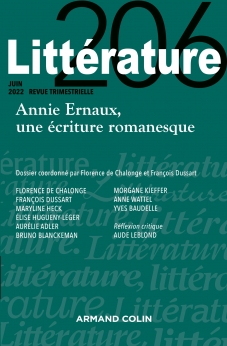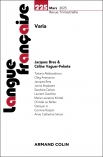
LITTÉRATURE Nº206 (2/2022)
Pour acheter ce numéro, contactez-nous
Recevez les numéros de l'année en cours et accédez à l'intégralité des articles en ligne.
Si les « ethnotextes » d’Annie Ernaux n’invitent a priori guère à une lecture en termes de « romanesque », il reste que s’y expriment des formes de « mythologisation » de soi que l’on examine ici sous l’angle de l’affirmation d’une dimension politique donnée à l’écriture. Ernaux paraît ne pas prendre suffisamment en charge la dimension « posturale » (Meizoz) et plus largement « représentationnelle » (Hamel) de la « politique de la littérature » qu’elle veut mettre en oeuvre dans ses textes. On s’attache ici à mettre au jour certaines postures, images et autres mythologies attachées à la littérature comme à la figure de l’écrivaine que cette volonté d’engager la littérature comporte, pour suggérer comment leur absence de thématisation pourrait in fine limiter le sens politique de son oeuvre.
If the « ethnotexts » of Annie Ernaux a priori hardly suggest a reading in terms of the « romantic », it nevertheless remains that they express forms of « mythologization » of self which we examine here in the perspective of the affirmation of a political dimension devoted to writing. Ernaux seems not to take enough into account the « postural » dimension (Meizoz) and more generally « representational » (Hamel) of the « politics of literature » which she wants to implement into her texts. We endeavour here to bring to light some postures, images and other mythologies attached to literature as well as to the figure of the female writer which this will to commit literature entails, in order to suggest how their lack of thematization could in fine limit the political meaning of her work.

